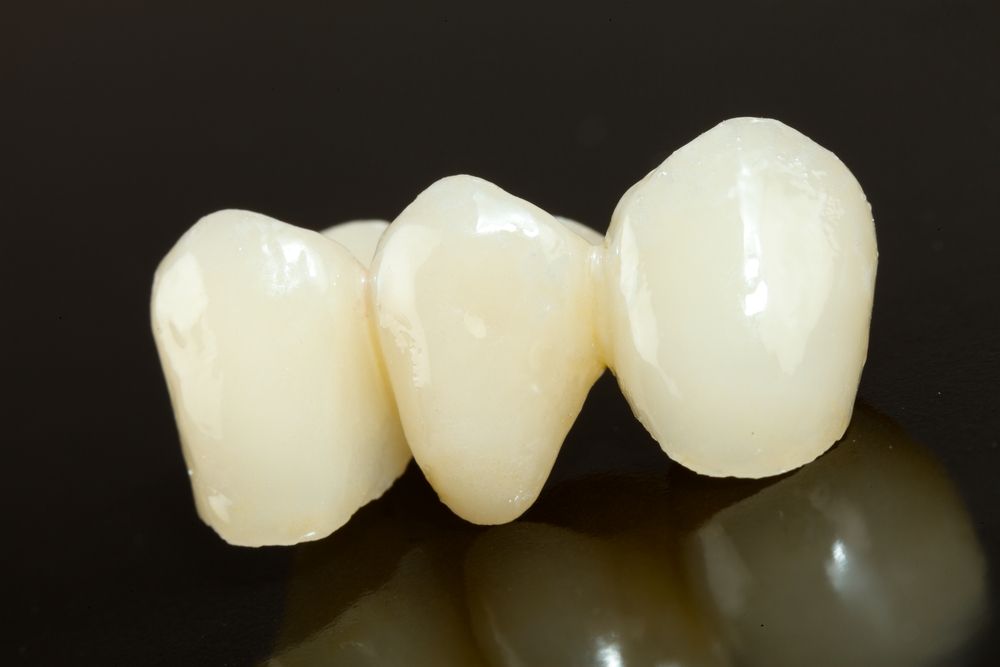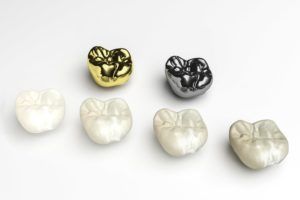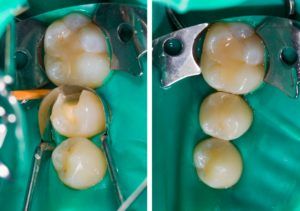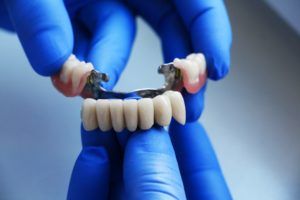Dental crowns and bridges are specialized dental prosthetics used to restore damaged, decayed, or missing teeth. Dental crowns are caps that fit over a damaged or decayed tooth. They can also be mounted on a dental implant to serve as a replacement for a missing tooth. Dental bridges are composed of two or more dental crowns that sit on the teeth surrounding a gap, and a pontic, or fake tooth, that spans over the gap left by a missing tooth.

Did you know…
Historically, different civilizations would used ivory, gold, and bones to make dental crowns. This was the norm for many years until the porcelain dental crown was invented during the 20th century.
Frequently Asked Questions
Am I a candidate for a dental crown or bridge?
You may be a candidate for a dental crown if you have a tooth or teeth that are severely damaged or decayed, as well as if you have teeth that are improperly shaped or stained. In addition, dental crowns may be used as a dental prosthetic for a dental implant or to support a dental bridge.
You may be a candidate for a dental bridge if you have a missing tooth or multiple missing teeth. Dental bridges are ideal for individuals with missing teeth because they prevent the remaining teeth from moving out of the correct position and causing additional issues.
To find out if a dental crown or bridge is the right treatment option for you, schedule a consultation with Dr. Pushpa Sachdeva of Ace Dental Care today!
Are there different types of dental crowns?
Yes, there are different types of dental crowns. The differences in dental crowns are based on the type of materials used for their fabrication. One of the first types of dental crowns that are highly common is the temporary dental crown. Temporary dental crowns are made in-office from acrylic-based materials or stainless steel and are put in place of the permanent crown until the permanent crown can be fabricated.
Permanent dental crowns can be made from a variety of different dental materials including metals, porcelain fused to metal, all-resin, and all-ceramic or all-porcelain. Metal dental crowns, made from gold, platinum, or cobalt-chromium and nickel-chromium alloys, offer one of the most durable and long-lasting dental crown options. However, they lack in aesthetics and are usually recommended for teeth in the back of the mouth.
Porcelain fused to metal dental crowns are a combination of metal with porcelain fused over the top to maintain an aesthetic appearance. While this type of crown offers an aesthetically-pleasing appearance, they have also been known to cause excessive wear on the adjacent teeth.
All-resin dental crowns are the most affordable dental crown option, however they lack in durability and will not last as long as the other options. All-ceramic or all-porcelain crowns are ideal for individuals who want to maintain an aesthetic appearance or for those with metal allergies.
Are there different types of dental bridges?
Yes, there are three different types of dental bridges that can be used. A traditional bridge, which is the most commonly used type of bridge, uses a series of crowns on the anchor teeth with a fake tooth in between. The crowns and fake tooth are generally made out of porcelain, porcelain fused to metal, or ceramic.
Another type of bridge is called the Maryland bonded bridge, which uses artificial teeth and gums made from porcelain, porcelain fused to metal, or plastic, as well as a metal framework. The Maryland bonded bridge is attached to the existing teeth with porcelain or metal wings.
Another type of bridge, which isn’t often used, is the Cantilever bridge. This type of bridge is used when there is only one anchor tooth on one side of the missing tooth. Because this type of bridge can put too much pressure on the anchor tooth, it is often only used in the back of the mouth.
Finally, there are implant-supported bridges, which used dental implants to secure the dental bridge. With implant-supported bridges, each missing tooth is replaced with a dental implant. In cases where each tooth cannot be replaced with a dental implant, a fake tooth will be supported by two implant-supported crowns.
What can I expect when having a dental crown or bridge placed?
When having a dental crown or bridge placed, the first thing you can expect is to have the tooth or teeth prepared. If the decay is severe enough, you may need to first undergo root canal treatment prior to having a dental crown placed. During the tooth preparation phase, your mouth will be properly anesthetized to keep you comfortable.
For a dental crown, the affected tooth will have enamel removed or reshaped to make room for the new crown. Depending on the material used for the dental crown, varying amounts of enamel may have to be removed. In some cases, additional filling material may have to be added to parts of the tooth so that it can safely support a dental crown. A dental impression will then be taken to use for the fabrication of your custom dental crown. While your permanent crown is being fabricated, you will be fit with a temporary crown.
For a dental bridge, the anchor teeth will need to be prepared for the bridge’s placement. Both the anchor teeth will be prepared for their dental crowns by removing and reshaping their enamel. Then, a dental impression will be taken so that the dental crowns and pontic can be custom fabricated in a dental lab.
Once your dental crown or bridge has been completed, it will be checked for color and fit before being cemented into your mouth. The dental crown or bridge will then be cemented in place.
Do I need to follow any special guidelines after having a dental crown or bridge placed?
If you have a temporary dental crown placed, you will need to avoid chewy or sticky foods, as they can damage or dislodge the temporary crown. You will also want to try to chew on the opposite side of your mouth and should avoid eating hard foods. Finally, you will need to slide the floss instead of lifting it to avoid breaking off the temporary crown.
Once your permanent dental crown or bridge is placed, you will care for it much like you would your natural teeth. This means brushing twice daily for two minutes at a time using fluoridated toothpaste, flossing once a day, and visiting Ace Dental Care at least twice a year for your dental check up and professional teeth cleaning.
Dr. Pushpa Sachdeva has been providing some of the best dental care in Nairobi for over 33 years. For comprehensive, family-friendly dental care for all ages, schedule a consultation at Ace Dental Care today!







